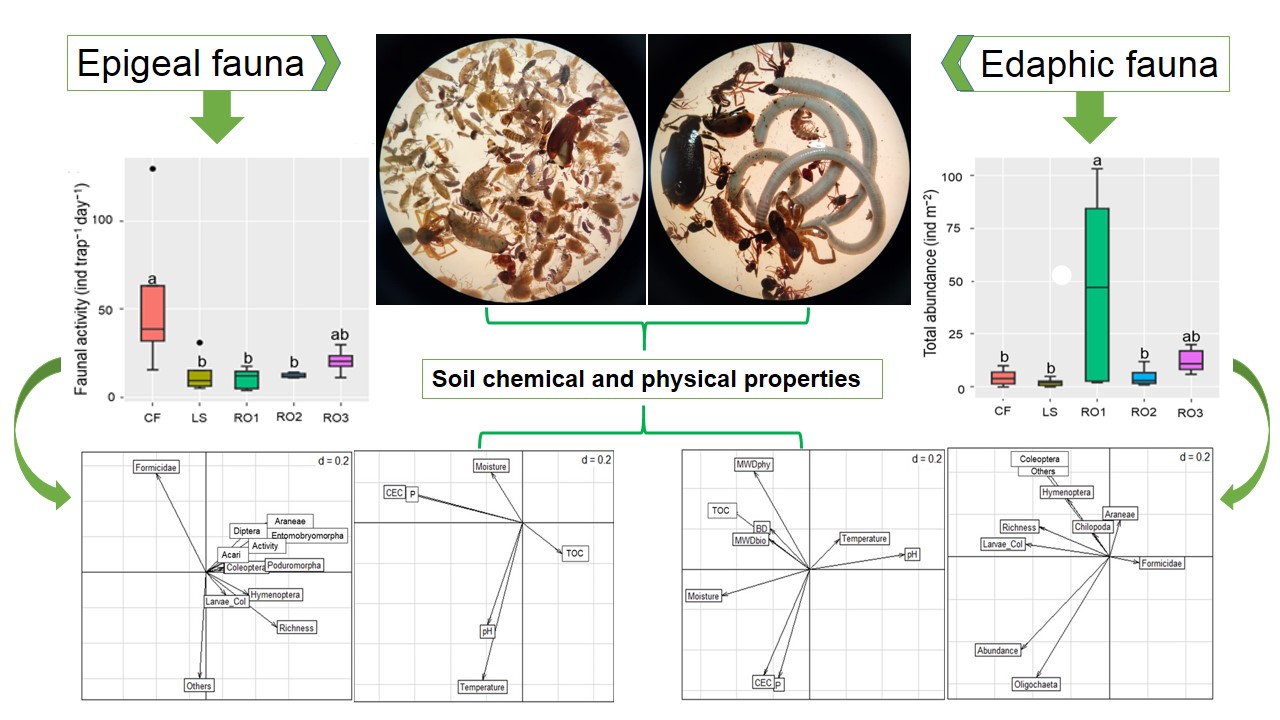Early termination of Sudan grass (Sorghum sudanense) used as soil cover in a soybean cropping system in the Brazilian Cerrado
06/nov/2025
ABSTRACT Sudan grass (Sorghum sudanense (Piper) Stapf.) shows potential as a cover crop under the no-tillage system in soybean growing under the conditions of the Brazilian Cerrado region, due to high biomass production under water deficit. The large amount of biomass produced can improve soil microbiological activity, but may also negatively affect subsequent soybean yield due to nutrient competition, particularly if termination of the cover crop is delayed. To improves the use of Sudan grass as a cover crop, this […]
Different managements in conventional sugarcane reform in sandy soils: effects on physical properties and soil organic carbon
07/jun/2022
ABSTRACT Sugarcane culture in Brazil has expanded the planting area to degraded pastures and sandy soils. Sugarcane field reform is carried out after five or more harvest cycles, with conventional tillage, followed by planting sugarcane, or growing soybeans or a cover crop. This study aimed to analyze the effects of these different managements in the conventional sugarcane reform on the physical properties and organic carbon in an Argissolo Vermelho distrófico arênico (sandy Ultisol), located at latitude 21° 13’ 40” south, […]
Edaphic fauna and soil properties under different managements in areas impacted by natural disaster in a mountainous region
24/ago/2021
ABSTRACT Soil invertebrate fauna plays a major role in several environmental processes, and its absence can negatively impact ecosystem health. This study aimed to assess the recovery of epigeal and edaphic invertebrate faunal communities following an environmental disaster, with landslides, mudflow, and river floods, in sites under different management systems, the effects of cover crops on invertebrate fauna, and their relationship with soil physical and chemical properties in the mountainous region of Rio de Janeiro State, Brazil. The following sites […]
Changes in Soil Organic Carbon and Nitrogen Stocks in Long-Term Experiments in Southern Brazil Simulated with Century 4.5
12/maio/2016
ABSTRACT The Century model has successfully simulated soil organic matter dynamics in many agroecosystems. However, initial applications in southern Brazil produced mixed results. The objective of this study was to calibrate and validate Century 4.5 to simulate soil carbon (C) and nitrogen (N) dynamics under diverse soil management practices in subtropical Brazil. Soil C and N data from two long-term experiments established on a degraded Acrisol in the early 1980s were used. Treatments were conventional or no-tillage; grass or grass/legume […]
Teor de nitrogênio solúvel na água de erosão hídrica em cultura de aveia e ervilhaca em três formas de semeadura
01/abr/2009
A perda de nutrientes por erosão hídrica causa empobrecimento do solo e reduz a produtividade das culturas, além de causar contaminação da água. O N solúvel na água de enxurrada é biodisponível, contribui para a eutrofização das águas e, dependendo de sua forma e teor, é tóxico aos organismos aquáticos. Com o objetivo de avaliar os teores de NH4+ e NO3– na água de enxurrada, realizou-se um experimento com chuva simulada, de abril a novembro de 2006, num Cambissolo Húmico […]
Liberação de nutrientes pela palhada de milheto em diferentes estádios fenológicos
01/dez/2008
Este estudo foi realizado na área experimental da Faculdade de Agronomia da FESURV – Universidade de Rio Verde, no sudoeste de Goiás, em um Latossolo Vermelho distroférrico textura argilosa, no período de outubro de 2004 a maio de 2005. Seu objetivo foi avaliar a liberação de nutrientes na palhada de milheto (Pennisetum glaucum), cultivar ADR300, em diferentes estádios fenológicos (pré-emborrachamento, pré-florescimento e início do florescimento). Utilizou-se essa cultura como cobertura de solo para o sistema plantio direto, em parcelas com […]

